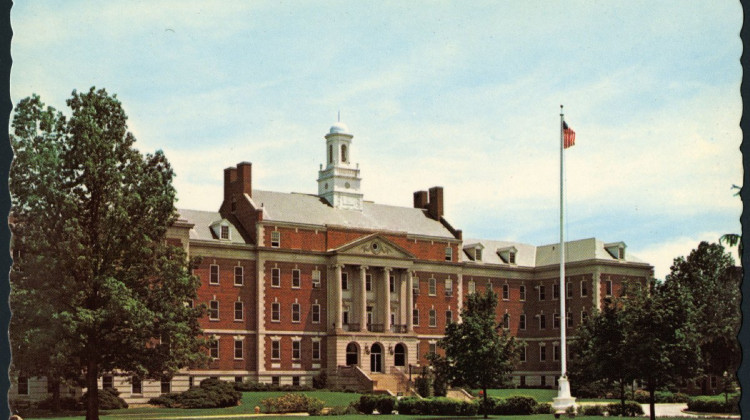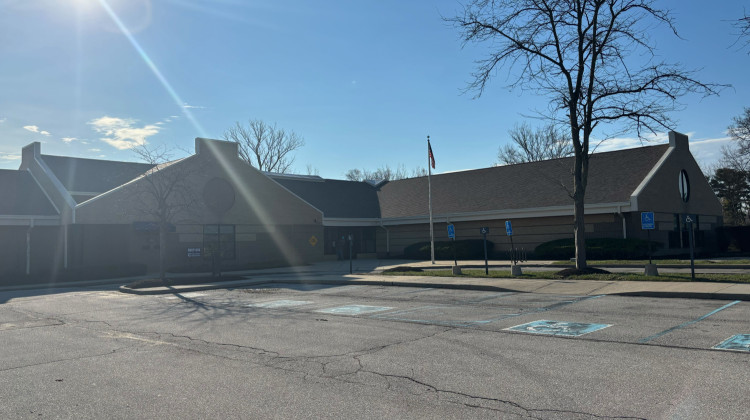Protesters on Indiana University’s campus calling for divestment from Israel have criticized the Indiana State Police for what they call an excessive display of force.
As of Monday police had arrested 57 people, including many faculty and students. Several protesters said they were hit, kicked and placed in chokeholds.
Indiana Public Media’s Ethan Sandweiss spoke with ISP Superintendent Doug Carter to ask about his department’s response.
This interview has been edited for organization and concision.
Sandweiss: You said in an interview with Fox the other day that there was some hate speech that ISP heard on campus. Could you give any examples of what that speech was?
Carter: I'm not going to repeat them. But it was encouraging the death of the Jewish people globally, and then it went on to just be some just very, very vile rhetoric of what they would do to us and to our families.
Sandweiss: Meaning police officers?
Carter: Yes. That’s why we're here, and that's okay. But the main issue is the hate speech associated with all Jews, including things on the university campus.
Sandweiss: I understand that it's not something you'd want to repeat, but I think for the purpose of this story, it's pretty important since this is a free speech issue. Could you get any more specific?
Carter: I think it would be inappropriate of me. Just let your mind wander: disgusting, terrible, personal, hateful, vile comments made about other people. Throughout all of that event, we tried to specifically rationalize with people we thought were the leaders of the group.
Ultimately, many of them faculty members of the Indiana University campus. So there were multiple attempts to try and de-escalate this very quietly and behind the scenes so that they could maintain at least the stability of their pro-Palestinian positions, which we will absolutely defend.
Sandweiss: I've also spoken with a couple of Jewish students who have been pretty involved in the protests on the pro-Palestinian side and a professor who's an Israeli citizen who doesn't really agree with the protesters but says he's been there at the rallies for quite some time and hasn't heard anything antisemitic. These Jewish students agree; they held a Passover Seder at the encampment, and nobody I've spoken with at the Indiana Daily Student or at our news organization heard anything that they characterize as antisemitic. What do you make of this discrepancy between the ISP report and the report from them?
Carter: I think that's anecdotal, and go on to the next question because I saw it with my own two eyes and they were so angry they were spitting as they were talking. So let’s go on to your next question, because that’s not correct.
Sandweiss: Is hate speech not also a protected First Amendment right?
Carter: Let's leave that for the lawyers. Let's leave that for the process that could occur after this.
Sandweiss: But it is speech. What line would this speech have to pass to become criminal speech?
Carter: The understanding of the First Amendment is not endless, I'll just leave it at that.
Sandweiss: In terms of folks who are across the street protesting in front of the Chabad House, were you viewing any potential threats there or worried about any kind of attack by counter protesters?
Carter: No, there's been no indication from any of those of those students in the house across the street that they've done anything even remotely close to this. They're not calling for the murder of all Palestinians. Most of the people up on the hill on the sidewalk, were very complimentary of us. As we left, they wouldn't look at us because they said they were afraid to but thank you for protecting us.
Sandweiss: I wanted to ask also about the nature of their response. There's a lot of police officers out there in military vehicles, people with sniper rifles. We've seen tear gas, automatic weapons. What led to that level of response? Is that necessary for what we saw in terms of the protests?
Carter: It's probably not necessary to the layperson that doesn't have to worry about things that I do.
Sandweiss: What are you worried about?
Carter: I'll be more than happy to explain that to you. What we're seeing here and the opinions that we have based on violence and then what we're seeing factually of what those threats are. All it would have taken is for someone to have to have been that martyr that opens fire on a crowd, and the only way to mitigate that is from above.
The overwatch location gives us the ability to pay attention to what's occurring overhead, not laterally on the field.
That got turned into a closed sniper position. Could it have become that? Yes. Was that our intent? No.
I've been accused of wanting another Kent State. Nothing could be further from the truth. Even so, that presence there is based on the possibility, not a probability.
Sandweiss: How high is the probability? Were weapons found in the camp? Any specific weapons that you're able to mention?
Carter: The probability of that occurring is probably pretty low.
Sandweiss: But there were no weapons?
Carter: There were rocks found. We had a trooper bit, we had a trooper with a broken finger. So again, should we respond to that after we find a threat and after people are injured, or should we be prepared for what the possibility is to occur? I don't expect you or your listeners to understand that, but my job is to protect all that are there based on a number of different scenarios that could occur.
Sandweiss: I spoke to a couple of people today who were at the protest including several graduate students and older faculty members who say they were hit in the face, shoved down, had their necks stepped on by ISP officers. Is that something you can address?
Carter: I can't confirm that. I can tell you that that we made it very clear what we would be doing to clear that area. Once we got through those tents and they were removed we didn’t continue to push that crowd. And then we backed off and let them continue to do what they did.
The professors were the ones that had the opportunity to de-escalate this. And many of them, in my opinion, did not make any attempt to deescalate this, which I believe was their intent.
Sandweiss: Talking about de-escalation tactics and things like that, are there any plans to scale down the presence of some of those weapons that we've seen on campus?
Carter: No.
Sandweiss: The crowd seems to be growing today, there’s still a pretty big presence in Dunn Meadow. What are the future plans for the ISP?
Carter: We’re not going to talk about that. There's a lot of discussion occurring right now with what could occur in the coming days, and if we have to come back then we will, but that’ll be at a time that is known only to us.
Talks with Pamela Whitten and Kerry Thomson
IU President Pamela Whitten explained her decision to invite the ISP in an email to campus last night:
“In our decision to engage the IU Police Department and the Indiana State Police, we aimed to balance each of these concerns: legitimate safety concerns related to un-regulated encampments and our commitment to free speech. After standing down for 24 hours, we sought to give the protestors the opportunity to comply with policy, particularly the 1969 prohibition of tents after 11 p.m. They chose to expand the encampment after 11 p.m. Therefore, on Saturday we again made the decision to enforce university policy and remove tents and other temporary structures. The Indiana State Police provided the additional manpower needed to address heightened levels of potential threats.”
Calls for Whitten to resign today referenced her decision to bring the ISP onto campus.
Bloomington Mayor Kerry Thomson has said the Bloomington Police Department will take no role in the protests and criticized the ISP for excessive force. Carter told Fox that he was disappointed by Thomson’s statement and that she was acting based on “what she thinks rather than what she knows.”
Carter said he met with Thomson this morning.
Sandweiss: Has the IU administration called out to ask for you to respond? What kind of response did they ask for? And are there any particular concerns they had in terms rules or laws that they wanted to be enforced?
Carter: Let me start with the reason we went there in the first place. We do a lot of work with IU, so it wasn't unusual for them to call and say, “we don't really know what's coming here, but we might need some help.”
I sent a contingent of field command down there, and they met on Wednesday, they met on Thursday, and there was tremendous coordination.
President Whitten was the person in the room that was asking really tough questions. So we talked about consequences, we talked about if we do A what will happen to B, and if B occurs what will C be? We talked about the 13 percent Israeli population of IU. (Note: IU Hillel estimates that around 10-12 percent of students there are Jewish, not Israeli.) . We talked about the number of people there, the parents there, the Jewish facility right across the street from Dunn Meadow.
Sandweiss: What kind of police presence was the president expecting or hoping for on campus?
Carter: I’m not sure quite how to answer that, other than we would have the proper people there to enforce Indiana law in the event that they did not choose to leave.
Sandweiss: Which Indiana law in particular was being enforced?
Carter: Specifically trespass.
Sandweiss: And they were trespassing because they had violated the rule that was created the night before?
Carter: Yeah. There's lots of discussion that needs to happen around that. I wasn't involved in that, but remember, there's always been a rule that that closes at 11 o'clock. No overnight camping.
There are several issues, there are legal issues and principles that'd be for lawyers to figure out, not necessarily for me.
Sandweiss: In terms of your ongoing communication with the administration, do you get a sense of where they're at in terms how worried they are about violence escalating and how concerned they are about protesters who have already been injured?
Carter: What do you mean by protesters that have been injured?
Sandweiss: The protesters who were injured when they were arrested.
Carter: I think that's a bit of a subjective term, number one. Number two, we are paying very close attention to the violence that could occur. And that will very likely be the trigger for us to come back again.
I've had a very, very good conversation with the Mayor of the City of Bloomington this morning, and I will continue that dialogue with her because I think there's things that could occur, that might help be able to help mitigate this from a leadership perspective. But we're going to need the organizers to participate in that as well.
Sandweiss: That conversation with Kerry Thomson, could you describe a little bit about what you guys talked about?
Carter: We talked about some of her comments that she had made, and when I gave her some of the reality, what actually occurred there. It was a very cordial, very nice conversation. She seems like a very nice lady.
 DONATE
DONATE







 Support WFYI. We can't do it without you.
Support WFYI. We can't do it without you.